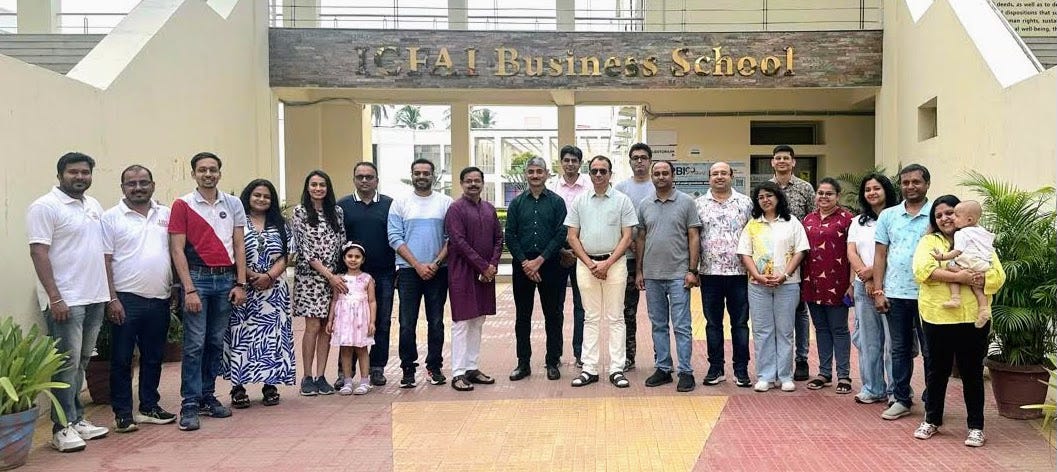It felt odd during the week to write or talk about digital and/or platform businesses when the country is facing threats and you loved ones are risking their lives defending the nation from hostile forces. Yet, I made some notes while on the Himalayan Trek and then caught up with more news when I reconnected with the world.





A week offline now feels like a decade of digital catch-up.
This week’s newsletter is all about navigating this fast, fragmented, and sometimes farcical world—with a fresh Himalayan perspective and sore legs. Let's unpack what changed while I was catching my breath at 4000 metres.
DTW
During the Week, Apple's announced in-app payment system changes primarily accommodating regulatory pressures, especially in the EU and the US. In the US, developers can now include external purchase links and communicate about external offers without Apple interference. The EU sees significant shifts due to the DMA, allowing developers to use alternative payment providers with reduced commissions (10% or 17%) and optional Apple payment processing for an extra 3%.
Transparency for EU users is enhanced with App Store labels and in-app disclosure sheets for alternative payment methods. Transaction history APIs are being updated for better tracking. For users, this could mean more payment options and clearer information about payment processing, along with improvements to Apple Pay features like order tracking and fund transfers. These changes aim to provide developers with greater flexibility while informing users about their transaction methods.
We also saw Google's settlement with Texas which involved allegations of deceptive tracking of users' location data, even when privacy settings suggested otherwise. This case highlights the scrutiny tech giants face regarding their data handling practices and the importance of user consent and transparency. While not directly about payment systems, it underscores the increasing regulatory attention on the behavior of dominant players in the digital ecosystem.
It's interesting to bring up Google's settlement with Texas in the context of Apple's in-app payment system changes. While seemingly unrelated, both situations touch upon the broader themes of antitrust concerns, market power, and the ability of large tech companies to influence digital commerce.
Similar to the pressures Apple faced regarding its in-app payment rules, Google's settlement reflects a pushback against practices perceived as anti-competitive or infringing on user rights. Both scenarios demonstrate the ongoing tension between the innovative potential of tech companies and the need for fair market practices and consumer protection. These legal and regulatory challenges can lead to significant shifts in how these companies operate, ultimately impacting developers and users alike. The outcomes often set precedents and influence the evolving landscape of digital commerce and user privacy.
Adding the context of Pinterest's settlement with a co-creator provides another angle on the complexities and potential disputes arising from the creation and success of digital platforms. In 2021, Christine Martinez, a creative marketing expert, sued Pinterest co-founders Ben Silbermann and Paul Sciarra, alleging she was unjustly excluded from the company's financial success despite contributing foundational ideas like organizing images on boards, the "Pin it" call to action, and key categories.
Martinez claimed a breach of implied contract, idea theft, and unfair business practices, stating she was promised compensation that never materialized even after Pinterest's significant financial gains. While she was never formally employed or given stock, she argued her contributions were integral to Pinterest's core functionality and early growth, even having her name embedded in the platform's source code.
While the details and outcome of this specific lawsuit's settlement aren't widely publicized, it highlights a recurring theme in the tech industry: disputes over the initial contributions and compensation of individuals involved in early-stage startups. These cases often revolve around verbal agreements, implied contracts, and the challenge of proving the significance of early contributions years after a company's massive success. Similar to the regulatory pressures on Apple and Google, this lawsuit underscores the human element and potential for conflict in the rapid growth and immense wealth creation within the tech sector.
Reflecting on Apple's in-app payment adjustments, Google's data privacy settlement with Texas, and Pinterest's co-creator dispute reveals a common thread: the increasing scrutiny and multifaceted challenges faced by dominant tech platforms. Regulatory pressures, legal challenges concerning market power and user rights, and even internal disputes over foundational contributions are shaping how these companies operate.
These episodes highlight the delicate balance between innovation, fair practices, and the rights of users and creators. The outcomes of these situations often set precedents, influencing the evolving landscape of digital commerce, data privacy, and the recognition of contributions within the tech ecosystem. Ultimately, they underscore the ongoing need for accountability and transparency as these platforms continue to exert significant influence in our digital lives.
OTW
Over the Weekend, I was glad to catch up with IBS Hyderabad MBA2012 Alumuni over at our campus. It was really heartening to meet them in person and catch up after a decade or so.
We had some interesting discussions on the ways to have more fruitful alumni participation in the campus life both personally and professionally. There was consensus around creating multiple small opportunities for alumni to visit and interact with stakeholders at campus either in person or even virtually.



After today’s response, I am filled with excitement and optimism for the future of our alumni community. I firmly believe that together, we can create meaningful connections, foster a vibrant network, and strengthen our ties with our esteemed alumni. At the outset, we could focus on
Building an Engaging Alumni Network: Our foremost goal should be to build an engaged and connected alumni network by creating opportunities for alumni to reconnect, network, and contribute to the growth of our institution. We must aim to organize a series of engaging events, both virtual and in-person, that cater to their interests and our students’ professional development needs.
Alumni-Student Mentorship Programs: One of our key focuses should be establishing mentorship programs ("Bridge the Gap") that facilitate meaningful connections between our alumni and current students. By pairing alumni with students who share common interests or career aspirations, we can provide valuable guidance and support, preparing our students for success in their chosen fields.
Alumni Speaker Series: At the earliest, we must launch an Alumni Speaker Series ("Building Futures, Together") that showcases the accomplishments and expertise of our alumni. This series will serve as a platform for alumni to share their knowledge, insights, and experiences with our community. We believe that this will not only inspire our students but also foster a sense of pride and engagement among our alumni.
Do let me know if you would like to contribute and grow together.
I Love You
Shailendra




